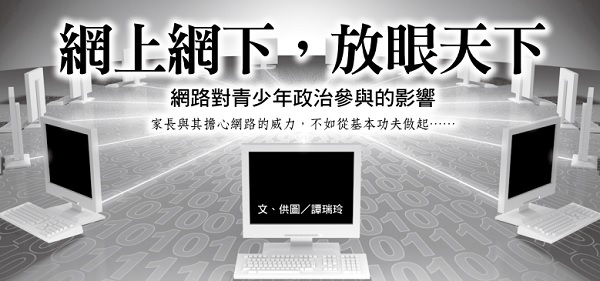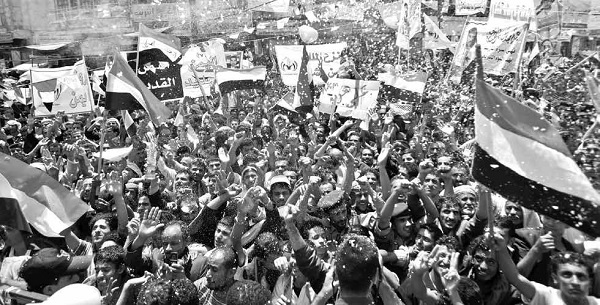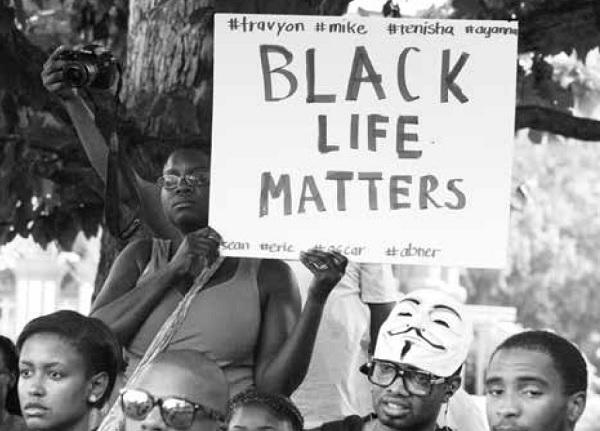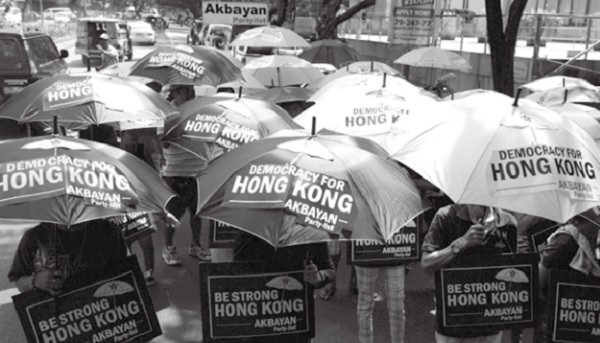Online and offline, look at the world
The impact of the Internet on youth political participation
Photo courtesy/Tan Ruiling

Many parents feel that the Internet is a scourge that not only corrodes and pollutes the young minds of their children, but also connects them to communities of unknown origin and may even incite their children to engage in extreme behavior. However, from a historical macro perspective, the Internet is only one of the media in historical development, and whether it will cause harm or not depends on the attitude and purpose of the users.

▲The Internet is just one of the media in historical development, and whether it will cause harm or not depends on the attitude and purpose of the users.
media in history
When the movable printing press, which subverted the development of culture, appeared in Europe, the Bible was no longer the exclusive property of the Catholic Church. Believers could gradually have their own Bibles, promoting the development of Christianity that was independent of the Pope's control of religious thought. However, printing enabled various ideological trends to spread widely, which also led to political turmoil and upheavals in people's livelihood in later generations.
In the past, when the telegraph first appeared, it was considered the fastest medium for transmitting information. As long as you can master this emerging technology, it is a symbol of a powerful country and a prerequisite for national modernization. Powerful countries can use telegraph messages to dispatch troops and generals over long distances according to local conditions. Therefore, having telegraph technology has also become an early warning tool for powerful powers to invade weak countries or suppress rebellious people. Today, paper media has begun to be abandoned, and telegraphs have disappeared without a trace. Who will remember these products that once made a difference and rewrote history?
The Internet and Political Participation in Today’s Generation
Compared with media invented before, the pace of the Internet is more epoch-making, and readers can obtain information instantly. The carrier is constantly updated through smartphones, breaking the previous restriction of having to sit in front of the computer; users can keep in touch with them anytime, anywhere, 24 hours a day, and at the click of a finger, information at every moment is instant, personal and overwhelming. Come.
This kind of high-speed information on the Internet naturally directly affects the speed of mass movement formation. Commonly used tools include Facebook, Twitter, YouTube, Instagram, etc. For example, after the police shot and killed an unarmed African-American youth in Ferguson, St. Louis County, Missouri, USA, on August 9, 2014, within an hour, witnesses appeared on the Internet messages and live photos taken nearby. In the first week of the demonstrations, there were 3.6 million Twitter citations, and a month later there were over 8 million directly related Twitter posts alone. 11
In the Middle East, most Internet users are young people. Even though the number of Internet users is not as high as in Western countries, its influence cannot be ignored. The protest movement known as the "Arab Spring" is also called the "Facebook Revolution", which shows the influence of the Internet. 22
On December 17, 2010, in a small town in Tunisia, a vendor set himself on fire in anger after being bullied by the police. Videos of suicides frequently circulated online triggered young people to take to the streets to protest. People expressed strong dissatisfaction with the regime of President Zine el-Abidine Ben Ali, who resigned from Saudi Arabia two weeks later. And this mass movement, through online sharing, spread throughout Egypt, Yemen, Libya, Syria and other places within three months.
In Tunisia, when YouTube was censored by the government, Facebook played a huge role. Its uploaded content was even translated into French so that the information could be exported overseas. Local people often hold stones in one hand to fight against the military and police, and hold mobile phones in the other to exchange news, making full use of the power of the Internet.
Another example is that in Egypt, some people used Internet tools to set up a Facebook page to oppose the State Security Investigation SSI's (State Security Investigation SSI) arbitrary human rights violations before the "Arab Spring" occurred, which was widely circulated. Even when governments shut down the Internet during the Arab Spring, some Internet providers continued to provide service, and foreigners rerouted the situation to their overseas networks through landline calls. Google also launched "Speak2Tweet", which allows Egyptians to use a set of phone numbers to leave messages, which can be turned into text messages and spread on Twitter.

▲The protest movement of the "Arab Spring" is also called the "Facebook Revolution", which shows the influence of the Internet.
Characteristics of young people born in the 1980s and 1990s
Compared with the rational age of the parents of the previous generation, who emphasized knowledge and truth in everything, and focused on organization, planning, and rational arrangements, this generation of young people is postmodern and tends to be more emotional, focusing on opinions, and prefers feelings rather than planning. They tend to hate authority and are also averse to tradition.
Especially in countries where freedom of speech is suppressed, young people lack confidence in the government and the media controlled by it. For example, under the rule of Egyptian President Mubarak, most media information is regulated from the top down. However, young people learned about the extravagant life of the president and his family through the Internet, and compared it with the constraints that a democratic society has on national leaders.
In Hong Kong, due to the gradual self-censorship of newspapers and television stations, more and more young people are browsing and trusting online news. According to a 2015 study by the School of Journalism and Communication at the Chinese University of Hong Kong, among those who participated in the June 4th Memorial Candlelight Vigil, those young people born after 1989 were mostly influenced by online information and discussions rather than traditional Information published by the media.

▲For many African-American teenagers in the United States, the Internet can connect ethnic groups that have been marginalized by mainstream society and unite people who are not connected.
How the Internet affects young people’s political participation
Some scholars believe that young people focus on the recognition of opinions and feelings. They will only connect with people who share their political ideas online and have less conversations with those who have different opinions. Their ideas will become more and more one-dimensional and they lack diversified thinking. At the same time, it is easy for teenagers to think that "likes" on the Internet mean that there is strength in numbers, leading to the misconception that one's own ideas belong to the majority of society.
However, for many African-American teenagers in the United States, the Internet can connect ethnic groups that have been marginalized by mainstream society and unite people who have been unable to connect in the past. They believe that their ethnic group is often ignored by the media and that online connections can build unity. Therefore, the African-American community uses online media, especially Twitter, more than other groups in the United States, so it is often called "Black Twitter."
After the police shooting of an African-American youth in Ferguson, the United States, African-Americans scattered across the country were able to connect online through the theme platform of "Twitter hashtag (#)." For example, "#Ferguson" can gather people who are concerned about the case; as some witnesses saw the young man who was shot and raised his hands in a gesture of surrender before he died, the spread of "#HandsUpDontShoot" was triggered; finally, in order to prevent the police from illegally The indiscriminate killings in the American community have made the African American community closer. They organized Millennial Activists United, used "#FergusonFriday" for regular reflection and interaction, and published the daily "This Is The Movement". Online gatherings transcend previous geographical boundaries and can connect people who are scattered across places but share the same intention, breaking away from the limitations of previous mass movements.
In addition, although the development of media in print, radio, and television has also been rapid, it has always been one-way (broadcast monologues), and readers and viewers are only silent receivers. On the contrary, in the Internet age, readers can interact and participate in discussions in real time, making issues multi-directional and mutual (social dialogues). Therefore, they can better cater to the preferences of young people and feel that their opinions are accepted or respected.
At the same time, people at the scene can also serve as on-site recorders, fulfilling their citizen responsibilities and reporting truthfully like journalists (citizen journalists). On the other hand, interested people who cannot participate immediately or are in different places can still participate simultaneously online (virtual participation), which can better satisfy the group effect of young people.
During the "Umbrella Revolution" that took place in Hong Kong in 2014, many young people living in other places were connected with the participants in this way. The civil demonstrations in Turkey in 2013 became even more transnational, with most of the Twitter messages coming from overseas. As a result, Prime Minister Recep Tayyip Erdogan's attempt to block the local Internet to suppress the demonstrators failed.
One of the advantages of the Internet is its speed. Therefore, when it comes to gathering people and calling for action, it can be mobilized in seconds, unlike past mass movements that required charismatic leaders or rigorous mobilization and organization. The traditional strategy of catching the thief first is no longer suitable for the young people of this generation. Some gatherings are often the spontaneous participation of individual groups, and then spread and connect like a virus.
Most young people participating in the Arab Spring were spontaneous, and there was almost no specific leader in the protests across several Middle Eastern countries. During the shooting incident in Ferguson, the United States, most demonstrators responded to Twitter individually and participated in the action. A "like", forward or share has changed the previous model of mass movements starting from leaders.
Advice for parents
1. Understand that participating in political activities can help expand the worldview
In Tunisia, young people took to the streets not just because a vendor set himself on fire, but also to protest against the country's widespread high unemployment and long-standing political problems. In fact, young people's participation in the Arab Spring is a response to the local government's long-term neglect of people's livelihood. The strong reaction of African-American youths to the shooting in Ferguson is also due to the fact that similar incidents often occur in the community.
Most of the topics and discussions caused by the Internet are in response to social conditions. Such interactions can deepen the depth of communication and thinking and promote the breadth of knowledge. They are not necessarily idle or unfounded chats that parents are worried about.
Many parents complain that their children are like otakus or otakus, sitting in front of the computer all day and addicted to video games, without real social life and lack of peer interaction. If children begin to pay attention to current affairs, care about government policies, and participate in community activities, it is a sign that children have progressed from being self-centered to being open-minded and looking at the world.
2. Grow up with your children
Wong Zhifeng, who has been involved in Hong Kong social movements since he was in middle school, once said that much of his in-depth understanding of politics and timely follow-up came from the Internet, especially Facebook. As parents, we should also keep pace with the times and care about the source of knowledge for our children. In fact, the information that children obtain from the Internet far exceeds what their parents can give them. Therefore, parents also need to enrich their knowledge and access the relevant websites their children browse to understand their opinions so that they can have conversations with their children.
3. Preventing extreme words and deeds starts from a young age
Modupe A., an African-American graduate of the University of Southern California, shared that many residents of Beverly Hills, a wealthy area in Southern California, are full of prejudice and far from reality when looking at issues involving the African-American community. However, if she wants to have a dialogue with opponents, she needs to find out topics that both parties are concerned about, and then gradually discuss them so that both parties can understand each other better.
In fact, you can find diverse voices by searching online, even on the same platform. For example, in the "Twitter hashtag #Ferguson", you can see completely different opinions, with voices supporting the murdered African-American young man Michael Brown and those supporting the shooting officer Officer Darren Wilson juxtaposed.
Instead of worrying about the power of the Internet, parents should start from the basics: strengthening the parent-child relationship from an early age. When your children become sensible, often discuss newspaper news or things happening around them with them, so as to establish correct values and principles of right and wrong. As children grow older, they must understand that their generation advocates anti-authority and emphasis on sensibility, and try not to force their own opinions in a paternalistic manner. It is best to listen first and then ask questions from different perspectives to help your children move from one-dimensional thinking to pluralism.

▲In the "Umbrella Revolution" that took place in Hong Kong, many young people took to the streets to demonstrate for their political ideals, regardless of their parents' opposition.
4. Firmness and tolerance go hand in hand
A Hong Kong female student who wanted to participate in the "Umbrella Revolution" said her parents did not allow her to participate and even scolded her with swear words, but she still took to the streets resolutely. Modupe A., who is passionate about the black civil rights movement in the United States, was born to Nigerian immigrant parents. Although she understands and agrees with the rights she fights for, she still feels that she should study hard first and realize the American dream that immigrants pursue.
If parents want to maintain a good interaction with their children, they should lead by example and show a sincere attitude of being willing to listen to different opinions. At the same time, they should maintain their firm stance and practice it to teach their children how to live peacefully with those who have different opinions without losing their personal value. outlook and principles.
5. Make good use of the power of faith
The Christian worldview is to "be in the world but not of the world." When we preach the gospel to the world, it is a confrontation between two completely different values. In order to save lost souls, we should be humble and listen to others' voices. At the same time, we should stick to our beliefs gently and rely on the power of God to change others' hard hearts through words and deeds. When children grow up in a Christian culture, they will be less likely to have a hostile mentality and become more empathetic and seek dialogue with those who disagree with them.
Technology continues to advance and media changes with each passing day, which can bring people closer and also touch society. Instead of worrying about its negative impact, we should learn together with our children, make full use of innovative functions, care for society, and understand the world.
Note 1:
Yarimar Bonilla and Jonathan Rosa, “#Ferguson: Digital Protest, Hashtag Ethnography, and the Racial Politics of Social Media in the United States,” American Ethnologist 42 no. 1 (2015): 4-5)
Note 2:
Gadi Wolfsfeld, Elad Segev, and Tamir Sheafer, “Social Media and the Arab Spring: Politics Comes First,” The International Journal of Press/Politics 18 no. 2 (2013): 118
 Author profile
Author profile
Dr. Tam Ruiling is willing to learn from the critical spirit of the Old Testament prophets with the perspective of a historian, examine the injustices of the past, speak out for the disadvantaged, and demonstrate the justice of the Kingdom of God. He is currently the editor of "The Voice of Yi Xian".
